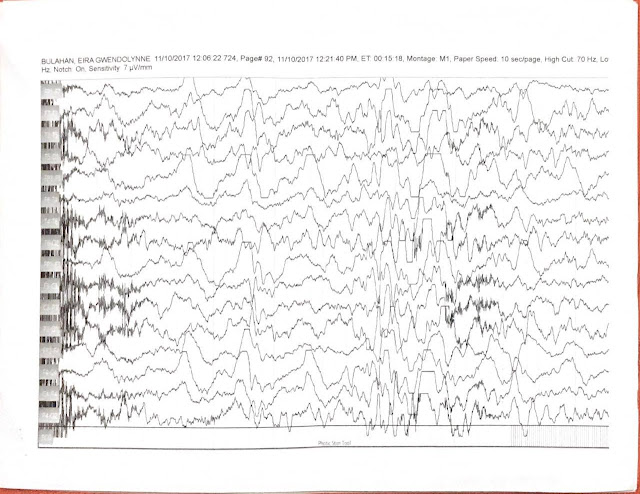I asked my daughter’s neurologist this question when we went for a consult soon after experiencing her first seizure attack.
What I learned after our neuro consult last week (Wednesday, November 8) is that seizure is typical among children with developmental delay.The risk of a child with a developmental disability experiencing an unprovoked seizure by age 5 is about 4 times greater than in the general population1.An overview on pediatric first seizure, published in Medscape, suggests that a recurrence may not be experienced by most children2. That's a relief...
But a seizure attack could mean two things:
- an initial presentation of a more serious medical condition; or
- subsequent epilepsy.
- what does this seizure episode mean for my daughter in the long term?
- will it further slow down her development?
What research tells me so far…
According to a neurologist in the Epilepsy Center at Boston Children’s Hospital, Tobias Loddenkemper, MD, he suspects seizure-like activity in the brain at night among some children with developmental delay3.These spikes of electrical activity in the brain gets easily undetected because “very few physicians have been looking to see what’s happening at night,” says Loddenkemper3.
Excess brain electrical activity at night can disrupt development — but if found, may be treatable3.
Final Thoughts...
Let’s go back to our initial questions:
- what does this seizure episode mean for my daughter in the long term?
- will it further slow down her development?
It means we get the opportunity to manage and control episodes with proper medical treatment. Treatment for seizure usually takes three up to five years.
From a neuro perspective, if seizure recurs especially at frequent intervals, there could be developmental milestones that may be slower to achieve.
If you suspect your child having seizure attacks, consult with your pediatrician right away, especially if your child has developmental delays.
I’m committed to learn more and understand seizure.
You can email me for questions related to seizure or any other neuro-related query and join me again in the next blog for answers from our neurologist.
____________________
References:
1Epilepsy Foundation Metropolitan New York. "FAQ Epilepsy and Developmental Disabilities." Retrieved on November 13, 2017 from http://www.efmny.org/faq/epilepsy-and-developmental-disabilities/
2Waite, Shelley R. November 29, 2016. "Pediatric First Seizure." Medscape. Retrieved on November 13, 2017 from https://emedicine.medscape.com/article/1179097-overview
______________
Recommended Books:

Description: An award-winning book used as the standard resource for parents in need of comprehensive medical information about their child with epilepsy.

Description: From a leading neurologist, experienced nurse practitioner, and registered dietician comes the complete guide to help your child achieve and maintain a high quality of life.

Description: Drugs commonly used to treat epilepsy have some extremely harmful side effects. This book is an empathetic, practical, empowering look at treatment options, lifestyle choices, and ways of living well.

Description: This concise, accessible handbook for families, friends and carers of children with seizures provides all the information they need to approach seizures from a position of strength.









No comments:
Post a Comment